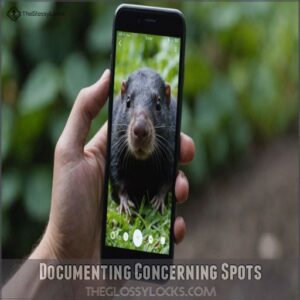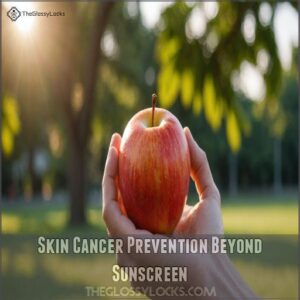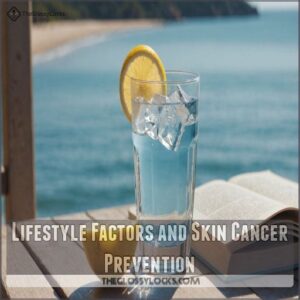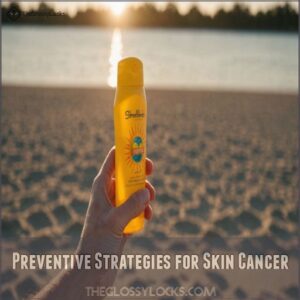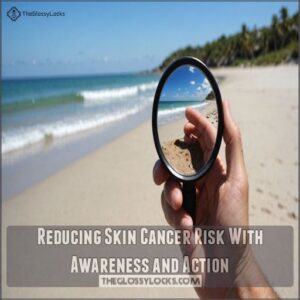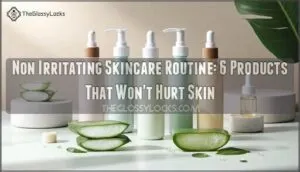This site is supported by our readers. We may earn a commission, at no cost to you, if you purchase through links.
 Can skin care be prevented? You can’t skip taking care of your skin, but you can certainly prevent certain problems with a proactive routine.
Can skin care be prevented? You can’t skip taking care of your skin, but you can certainly prevent certain problems with a proactive routine.
Start with sunscreen—your skin’s best shield against harmful UV rays and premature aging.
Don’t forget a healthy diet—think of antioxidants as tiny superheroes fighting damage beneath the surface.
Genetics do play a role, yet knowing your family’s skin cancer history helps you make informed choices.
Throw in some stress management and you’re on a roll.
Curious about how mixing lifestyle tweaks can boost your skin’s defense? There’s more to learn as you begin this protective journey!
Table Of Contents
- Key Takeaways
- Skin Cancer Risk Factors
- Daily Sun Protection Habits
- Recognizing Skin Cancer Signs
- Skin Cancer Prevention Beyond Sunscreen
- The Role of Genetics in Skin Cancer
- Lifestyle Factors and Skin Cancer Prevention
- Preventive Strategies for Skin Cancer
- The Importance of Early Detection and Treatment
- Integrating Holistic Approaches to Skin Cancer Prevention
- Reducing Skin Cancer Risk With Awareness and Action
- Frequently Asked Questions (FAQs)
- Can skin cancer be prevented?
- What are some of the basic skincare tips to prevent acne?
- What is good skin care & why is it important?
- How do I take care of my Skin?
- How can I reduce my skin cancer risk?
- Is skin cancer treatable?
- How can we prevent skin care?
- Can you stop skin care?
- Can you become immune to skincare?
- Do we really need skin care products?
- How effective is diet in preventing skin cancer?
- Can tanning beds cause skin cancer?
- What are alternative sun protection methods?
- Do tattoos affect skin cancer detection?
- How does climate affect skin cancer rates?
- Conclusion
Key Takeaways
- You can’t prevent the need for skincare, but you can prevent many skin issues through consistent sun protection, proper cleansing, and moisturizing.
- Your genetics influence your skin cancer risk, but you will significantly reduce your chances by conducting monthly self-exams and scheduling regular dermatologist check-ups.
- You will strengthen your skin’s defenses by maintaining a balanced diet rich in antioxidants, limiting alcohol consumption, and staying hydrated.
- You don’t need an extensive skincare routine, but you shouldn’t skip the essentials: sunscreen (SPF 30+), gentle cleanser, and moisturizer.
Skin Cancer Risk Factors
Understanding the risk factors for skin cancer helps you take control of your health.
Sun exposure adds up over time, and factors like ethnicity and family history can greatly affect your risk.
Cumulative Sun Exposure Causes Skin Cancer
Did you know relentless sun exposure is like ordering UV damage on repeat? It might seem harmless, yet it’s a stealthy skin aging culprit. Want to dodge it?
- Seek shade like it’s your best friend.
- Wear a wide-brim hat during sunny strolls.
- Don sunglasses to protect those peepers.
- Lather on sunscreen, even for quick car rides.
These steps keep melanoma risk at bay.
Ethnicity and Skin Cancer Risk
While everyone’s susceptible to sun damage, skin cancer risk isn’t uniform.
Darker skin tones offer some natural protection, but that doesn’t mean you’re immune.
Melanoma mortality rates, sadly, are higher in some ethnic groups.
Let’s look at this closer:
| Skin Tone | Sunscreen Effectiveness | Cultural Beliefs | Other Factors |
|---|---|---|---|
| Lighter | High | Often prioritize sun protection | |
| Medium | Moderate | Varies widely | Genetics, lifestyle |
| Darker | Lower | May underestimate risk | Access to healthcare |
| Very Dark | Low | Often prioritize sun avoidance |
Understanding these skin cancer disparities helps tailor your sun safety plan. Knowing that up to 90% of UV radiation can pass through clouds, as shown in the effects of tanning through clouds, is crucial to preventing skin damage.
Remember, sunscreen’s your friend, regardless of your ethnic skin type.
Family History and Genetic Predisposition
Knowing your family’s health narrative can shine a light on your skin cancer risk.
Inherited mutations, like souvenirs from your ancestors, might increase this risk.
Genetic testing and counseling are your roadmap for understanding these possibilities.
Armed with your family history, you can make informed decisions, enhancing your control over future skin health challenges.
Daily Sun Protection Habits
You can’t always rely on cloudy skies as a substitute for sunscreen, so make applying it part of your morning routine to shield against harmful UV rays.
Choose a broad-spectrum sunscreen with SPF 30 or higher, and don’t forget to reapply it every few hours, especially if you’re outdoors.
Applying Sunscreen Correctly
Think of sunscreen as your skin’s invisible shield.
Apply it consistently, even if you’re just popping out for a bit.
Use a generous dollop (like a shot glass amount) for your body, and don’t forget the ears!
Reapply every couple of hours, especially after a dip in the pool, ensuring you maintain that SPF level shield.
Choosing The Right Sunscreen
After applying sunscreen, picking the right one matters just as much! Here’s how to make sure you’ve got it right:
- Check SPF levels: Opt for SPF 30 or higher.
- Sunscreen ingredients: Look for zinc oxide or avobenzone, and consider choosing the right sunscreen for your specific skin type, whether it’s oily, dry, combination, sensitive, or acne-prone.
- Broad-spectrum protection: Shields against UVA and UVB.
- Water-resistance: Important if you’re sweating or swimming.
Using Sun-Protective Clothing
Every sunny stroll can feel like a sunbathing session.
Embrace sun-protective clothing to shield your skin effortlessly.
Select gear with UPF ratings for better protection.
| Fabric Types | Clothing Styles | Laundry Care |
|---|---|---|
| Tightly woven | Long sleeves | Use gentle detergents |
| Dark colors | Wide-brimmed hats | Avoid fabric softeners |
| Polyester blends | Pants or leggings | Line dry for longevity |
These choices amplify protection and your peace of mind.
Recognizing Skin Cancer Signs
Spotting early signs of skin cancer can make a big difference in treatment success, so keep an eye on any new or changing spots on your skin.
Conducting monthly self-exams and documenting any unusual growths will help you stay on top of your skin’s health.
Identifying New Growths and Spots
So, you’ve mastered sunscreen—great job!
Now, let’s talk about spotting potential problems.
Keep an eye out for new spots or changes in existing ones.
Look for these warning signs:
- Spot asymmetry: One half doesn’t match the other.
- Border irregularity: The edges are ragged, blurry, or uneven.
- Color variation: The color isn’t uniform; it might’ve shades of brown, tan, black, red, or white.
Catching these early can make all the difference.
Conducting Monthly Self-Examinations
Noticed a new growth or spot?
It’s time for your monthly self-exam.
Think of it as giving your skin a friendly check-up.
Look under your armpits, behind your ears, and yes, even the soles of your feet.
Self-exams are your secret weapon against sneaky skin changes.
Catching changes early helps you stay on top of any potential issues.
Documenting Concerning Spots
Capturing changes in your skin can be as simple as snapping a “spot photo.”
Use a Moles app to track changes over time, and consider investing in specialized products from a Mole tracking store(Mole tracking store).
Create a skin diary and regularly update it.
When documenting, follow these steps:
- Spot photography: Capture clear images.
- Spot comparison: Match old photos.
- Tracking changes: Note any differences.
Skin Cancer Prevention Beyond Sunscreen
Regarding preventing skin cancer, sunscreen isn’t your only ally. You can boost your defenses by eating nutrient-rich foods, limiting alcohol, and discussing supplements with your dermatologist.
Eating a Balanced Diet Rich in Phytonutrients
Picture your plate as a colorful garden of phytonutrient-rich foods like berries, leafy greens, and nuts.
These antioxidants for skin boost your defense against skin cancer and help in dietary prevention.
In addition to a balanced diet, understanding your skin cancer risk factors, such as sun exposure risks, can also help you take proactive steps for prevention.
Think of it as armor for your skin!
A balanced diet plays a big role in nutrition for skin cancer prevention.
Feed your skin like the hero it is.
Reducing Alcohol Consumption and Caffeine Intake
Balancing a diet with phytonutrients is great, but let’s talk alcohol and caffeine. Cutting back can lower skin cancer risks.
Here’s how: 1. Limit Alcohol: Excess boosts cancer risk.
- Moderate Caffeine: While some research sees benefits, overdoing it isn’t ideal.
- Hydrate Well: Water supports skin health.
Remember, small changes today can make big differences tomorrow.
Discussing Sun-Protective Supplements With a Dermatologist
While reducing alcohol is a great step, ask your dermatologist about sun-protective supplements.
Understand their effectiveness, potential risks, and interactions.
Here’s a quick rundown:
| Supplement | Purpose | Cost |
|---|---|---|
| Heliocare | Antioxidant protection | Moderate |
| Niacinamide | Reduces skin cancer risk | Affordable |
| Polypodium | UV protection | Higher |
These could boost your sun defense strategy, but always consult a pro.
The Role of Genetics in Skin Cancer
Your genes play a significant role in your skin cancer risk: some inherited mutations increase your chances, while others offer more protection, making understanding your family history important.
Genetic testing can help determine your personal risk level, allowing for more targeted prevention strategies.
Inherited Mutations and Skin Cancer Risk
Understanding your genetic makeup can shed light on your skin cancer risk.
Some inherited mutations up the ante, linking closely to melanoma risk and other rare syndromes.
You can also explore options for genetic testing melanoma products online through genetic melanoma tests.
Be proactive:
- Know your family history
- Discuss mutation screening with a doctor
- Stay vigilant for new skin changes
- Maintain healthy skin care habits. Understanding your skin type and following a personalized routine, such as a skin care routine for a healthy complexion. Maintain healthy skin care habits
These steps can help manage risk responsibly.
Genetic Testing for Skin Cancer
Inherited mutations boost your skin cancer risk.
Genetic testing reveals your melanoma risk and potential BRCA mutations.
Consider if you’ve got a family history of cancer.
| Test Type | Purpose | Cost ($) |
|---|---|---|
| Single Gene | Identifies specific genes | 100-200 |
| Multi-Gene Panel | Broad genetic insight | 400-1500 |
| Whole Genome | Full analysis | 3000+ |
Genetic counseling can guide you on results.
Lifestyle Factors and Skin Cancer Prevention
You can greatly lower your risk of skin cancer by managing stress and getting enough sleep, which help keep your immune system strong.
Environmental toxins and pollution can weaken your skin’s defenses against harmful UV rays, so avoid exposure to them.
Managing Stress and Getting Enough Sleep
Chronic stress is like a thief robbing you of restful sleep, which can sneakily raise your risk of skin cancer.
Keeping stress in check with relaxation techniques—mindfulness, yoga, or even a nice walk—can boost sleep quality.
Good sleep hygiene matters: keep a consistent bedtime and make your room a cozy sleep sanctuary.
Rest well, stay well!
Avoiding Environmental Toxins and Pollution
You’ll often hear about avoiding air pollution and toxin exposure for skin health.
Think of your skin as a shield—it’s got to fend off harsh chemicals and pollution daily.
Choose skincare products wisely, aiming for gentler ingredients, and make sure your water quality is good.
It’s like giving your skin a break from life’s rough patches, reducing chemical exposure effectively.
Preventive Strategies for Skin Cancer
To reduce your risk of skin cancer, consider chemopreventive agents for nonmelanoma types and explore the benefits of nicotinamide for basal and squamous cell carcinomas.
These strategies, combined with daily sun protection, can help you take proactive steps toward healthier skin.
Chemopreventive Agents for Nonmelanoma Skin Cancer
Preventing nonmelanoma skin cancer involves exploring chemopreventive agents, and incorporating skincare routines that include ingredients like Vitamin C for skin brightening.
Research shows some promise with beta-carotene, isotretinoin, and others, but more studies are needed to confirm their efficacy.
Clinical trials are ongoing, offering hope for future treatments.
These agents aren’t a magic bullet; they’re one piece of the puzzle alongside sun protection and regular check-ups.
Patient perspectives are essential in evaluating these options.
Nicotinamide for Basal Cell Carcinoma and Squamous Cell Carcinoma
Thinking about boosting your skin’s defenses with nicotinamide?
This vitamin B3 supplement can lower basal cell and squamous cell carcinoma risks.
You can find various nicotinamide products online at a nicotinamide supplement shop.
Clinical trials show promising results, with few side effects even in long-term use.
Consider adding nicotinamide to your routine for extra protection.
Still, chat with your dermatologist about the right dosage and whether it’s a fit for you.
The Importance of Early Detection and Treatment
Catching skin cancer early is very important, so don’t put off those regular check-ups and screenings with your dermatologist.
By addressing concerns promptly, you greatly boost your chances of effective treatment and a healthier outcome.
Finding a Trustworthy Dermatologist
Finding a dermatologist you trust feels like finding the right dance partner—someone in sync with your needs.
Check patient reviews to see if others groove to the same tune.
Communication skills are key, so make sure you’re comfortable discussing concerns.
Remember, building trust with your specialist can lead to better outcomes.
It’s not just skin deep, it’s personal.
Scheduling Regular Check-Ups and Screenings
A trustworthy dermatologist is your ally in staying ahead of skin cancer.
Regular check-ups play like sunscreen for your peace of mind.
Here’s how to ace the routine:
By incorporating a daily skincare routine that includes protecting skin from sun damage, you can reduce your risk of skin cancer and premature aging.
- Book annual screenings even your skin seems fine.
- Track changes in moles or spots.
- Ask questions during visits.
- Update contact info to get alerts about check-ups.
Not Delaying Appointments for Skin Concerns
Don’t brush off that weird mole or itchy spot on your skin; early action is your best ally.
Prompt treatment can save you a lot of trouble down the road.
Trust your dermatologist—they’re like your skin’s superhero, ready to fight off villains before they become a real problem.
Seeking timely advice makes sure you’re always one step ahead.
Integrating Holistic Approaches to Skin Cancer Prevention
When you’re looking to keep your skin safe from cancer, blending conventional treatments with alternative methods can offer a well-rounded defense.
Commit to a balanced lifestyle by eating nutritious meals and staying active, making sure your skin benefits from all angles.
Combining Conventional and Alternative Methods
Early detection is your best weapon against skin cancer.
But what about prevention?
A holistic skin care approach blends the best of both worlds.
You can combine regular checkups with a dermatologist with natural remedies and lifestyle changes.
It’s about taking charge of your health.
- Imagine feeling empowered to protect your skin.
- Picture yourself confident in your choices.
- Envision glowing skin that reflects your inner wellness.
- Visualize the peace of mind from proactive care.
- Think of the freedom to enjoy life without worry.
Maintaining a Healthy Lifestyle and Diet
You’re on the path to great skin health by embracing healthy eating, which is just one part of a proactive maintenance routine that focuses on cleansing and sun protection.
Think of a diet rich in fruits, vegetables, and antioxidants as a superhero cape.
Here’s a guide:
| Habit | Benefit |
|---|---|
| Fruits | Boosts skin repair |
| Vegetables | Fights free radicals |
| Hydration | Keeps skin supple |
| Healthy Fats | Locks in moisture |
| Antioxidants | Diminishes damage |
Keep nourishing from the inside!
Reducing Skin Cancer Risk With Awareness and Action
You’re already a step ahead in reducing skin cancer risk by learning about it, and adopting a consistent effective skincare routine for wrinkles can be key to prevention, and spreading awareness can help others protect themselves too.
By taking proactive measures like using sunscreen daily and monitoring your skin, you’re actively safeguarding your health.
Educating Yourself and Others About Skin Cancer
Think of skin cancer awareness as your sunscreen for knowledge.
Learning and sharing can be your secret weapon against sun dangers.
Here’s a quick checklist to educate yourself and those around you:
- Self-exams: Regularly check your skin.
- Prevention tips: Embrace sun safety practices.
- Sun hats: Wear them stylishly.
- Fact-based articles: Read and distribute.
- Dermatologist visits: Schedule annually.
Taking Proactive Steps to Prevent Skin Cancer
While understanding skin cancer is key, taking proactive steps can make a world of difference.
Use sunscreen daily, even if you’ve heard the myths.
Ditch tanning beds; they’re trouble, not tan.
Swap casual sun exposure for safe shade routines.
Integrate healthy habits like nutrition and hydration.
Your future self will thank you for these sun safety tips.
Frequently Asked Questions (FAQs)
Can skin cancer be prevented?
Yes, you can greatly reduce your risk. Daily sunscreen, regular self-exams, and a healthy lifestyle are your best defenses. Early detection saves lives.
What are some of the basic skincare tips to prevent acne?
To prevent acne, look for a gentle cleanser that suits your skin type and contains hydrating ingredients like hyaluronic acid, wash your face twice daily with a gentle cleanser.
Avoid touching your face.
Use oil-free products.
Exfoliate regularly.
Stay hydrated.
Eat a balanced diet.
And don’t pop pimples.
What is good skin care & why is it important?
An ounce of prevention is worth a pound of cure.
Good skin care, including cleansing, moisturizing, and sun protection, keeps your skin healthy and glowing.
It prevents issues like acne and premature aging, boosting your confidence.
How do I take care of my Skin?
Taking care of your skin means cleansing daily, moisturizing, and applying sunscreen.
Eat a balanced diet, hydrate, and sleep well.
Avoid over-exfoliating and harsh products.
Monitor skin changes and consult a dermatologist regularly for healthy, glowing skin.
How can I reduce my skin cancer risk?
Imagine catching a sunbeam with sunscreen armor.
Apply SPF 30+ daily, wear sun-protective clothing, and seek shade.
Regular skin checks and a healthy diet full of antioxidants further guard against skin cancer’s unwelcome surprise.
Is skin cancer treatable?
Yes, skin cancer is treatable, especially when caught early.
Treatments range from minor surgery and topical medications to radiation or chemotherapy.
Early detection through regular check-ups greatly improves outcomes, making annual dermatologist visits very important.
How can we prevent skin care?
You can’t "prevent" skincare since it’s a practice, but you can simplify it.
Stick to essentials: cleanse, moisturize, and protect with SPF.
Shorten steps for busy days, but never skip sunscreen.
Your skin will thank you!
Can you stop skin care?
While it’s not advisable to stop skin care completely, taking breaks from certain products can benefit your skin.
However, daily essentials like sunscreen and gentle cleansing shouldn’t be skipped for the best possible skin health.
Can you become immune to skincare?
Like regular gym-goers who plateau, skincare products don’t make you immune, but your skin can adapt.
Switch up your routine every few months and adjust products based on your skin’s changing needs.
Do we really need skin care products?
Basic skincare products, including those with SPF 30 or higher for sun protection for lupus, protect your skin’s health and prevent damage. A gentle cleanser, moisturizer, and sunscreen form the essential trio. Other products can target specific concerns but aren’t always necessary.
How effective is diet in preventing skin cancer?
Your diet plays a key role in skin cancer prevention.
Foods rich in antioxidants and phytonutrients can help protect your skin cells.
While reducing alcohol intake further lowers your cancer risk.
You’ll benefit most alongside sunscreen use.
Can tanning beds cause skin cancer?
Quick as a flash, tanning beds can damage your DNA and dramatically increase skin cancer risk.
They’re actually more dangerous than natural sunlight, raising melanoma risk by 75% when used before age
What are alternative sun protection methods?
Wear protective clothing like long sleeves and wide-brimmed hats. You’ll also want UV-blocking sunglasses, UPF-rated fabrics, and seek shade between 10am-4pm. Protective window films in cars help too.
Do tattoos affect skin cancer detection?
Tattoos can make it harder to spot changes in moles and skin lesions.
It’s essential to photograph your tattoos when fresh and monitor any skin changes beneath them during regular self-checks.
How does climate affect skin cancer rates?
Living in sunny, high-altitude regions increases your skin cancer risk.
You’ll face higher UV exposure near the equator and in places with less cloud cover, so you’ll need stronger sun protection.
Conclusion
Preventing proper skin care isn’t possible, but you can protect yourself from serious skin issues.
By following a proactive approach—including daily sunscreen, regular check-ups, and healthy habits—you’ll greatly reduce your risk of skin cancer and other concerns.
Remember, while you can’t control genetics, you can control your choices.
Stay informed, stay protected, and don’t hesitate to consult a dermatologist when needed.
Your skin’s health is worth the investment in prevention.







